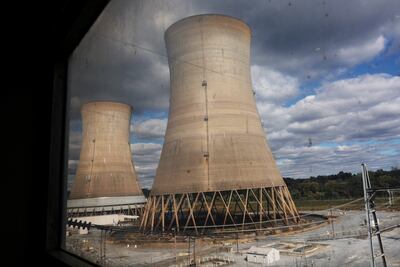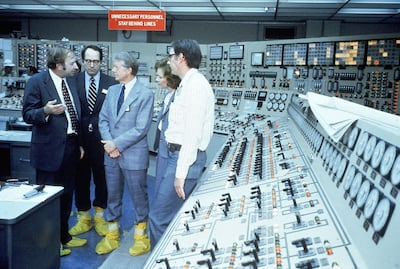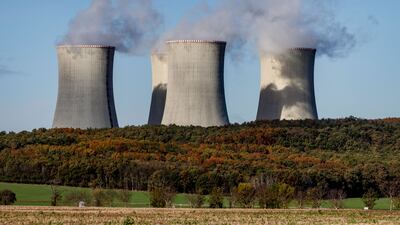Just when it looked like the world was ramping up for a nuclear power renaissance, driven in part by AI's insatiable appetite for energy, something unexpected happened: AI became more efficient.
At least that is the claim made by DeepSeek, the Chinese AI platform that purports to do as much as OpenAI's ChatGPT with far less computing power and fewer data centres, and therefore less energy.
Those claims sent several energy companies' stock prices briefly careening, including Constellation Energy, which recently made the most of the energy requirements of AI to boost its nuclear power offerings to technology companies.
Just how intense was that need for more energy to propel AI data centres? Last September, Constellation Energy announced it would be restarting the Three Mile Island Unit 1 in Pennsylvania as part of a 20-year power purchase agreement with Microsoft.
Three Mile Island (TMI) was the site of the one of the biggest nuclear accidents in US history. In 1979, the core of Unit 2 was partially exposed, leading to a temporary evacuation of the nearby area and a lengthy clean-up.
The accident left a black mark on the US nuclear industry, one that remains to this day, although recent polling has suggested those concerns may be waning.
All that said, debates remain about the potential health effects stemming from the accident, and research is continuing.
During a recent interview at Microsoft's headquarters in Redmond, Washington, Alistair Speirs, the company's senior director of infrastructure, was asked by The National if the technology giant was taking a pronuclear energy stance with some of its recent moves to power its AI ambitions, particularly the agreement with Constellation Energy.
“Our stance is zero carbon energy,” he said. “We really look at that as the view, so the next question is where can we source zero carbon energy?”
He said Microsoft uses power purchase agreements (PPAs), which are long-term contracts committing to a set amount of energy usage from the grid. That way, Microsoft ensures that the energy provided is supplemental, and therefore not raising energy prices for consumers.
“We're essentially sending a supply signal to the utility providers,” he said, referring to the deal with Constellation Energy's Three Mile Island.
Mr Speirs said that other sources of energy such as hydrogen, solar and wind, depending on the location of data centres, are also in the mix for Microsoft.
The tech giant is not alone in its push to meet the energy needs of data centres. Alphabet, parent company of Google, along with Amazon, Oracle, OpenAI and others have recently expressed interest in using small modular nuclear reactors (SMRs) to help meet those needs.
Mr Speirs spoke to The National in January, before DeepSeek debuted. Some have suggested that increased AI efficiency will blunt and possibly put an end to efforts at bolstering nuclear energy.
That speculation was the main ingredient that led to a sudden drop in Constellation's stock price in late January, along with other energy companies amid the rise of DeepSeek.
Maryam Salman, a senior consultant for Middle East markets at Qamar Energy, said that the situation is far more nuanced, and that DeepSeek's emergence is hardly a death blow for a nuclear renaissance.
“While it is true that the launch of DeepSeek upended investor confidence in nuclear energy for data centres, especially in the West, the underlying nuclear thesis remains intact – power demand is on the rise and will continue growing, whether from homes, factories, commerce, industry [or] new technologies,” she said.
“AI is infinitely scalable, and as new applications emerge and competition intensifies between the US and China, innovation will accelerate, ensuring sustained power demand for the sector. In this context, investing in nuclear energy can serve as a hedge against the unpredictable future of AI power needs,” she added.
Andrea Zanon, chief executive of Confidente, a Washington-based consulting group echoed those sentiments. “I don't want to say it's a no-brainer, but it's clearly happening,” he said, referring to the increasingly prominent nuclear energy push, particularly for smaller, modular nuclear reactors.
He was not very concerned about DeepSeek's long-term impact on energy stocks, particularly nuclear energy. “It's a part of, unfortunately, the panic and the psychology of money,” he said “This AI revolution is only at the beginning and it's going to be manifold bigger than what we see in the news every day, therefore the clean tech aspect, nuclear, will be needed.”
Yet for all the analyst optimism, there remains a stigma around nuclear power. The shadows of the 1979 accident at Three Mile Island, Chernobyl's deadly 1986 explosion and Fukushima's 2011 disaster loom large.
Eric Epstein is director of Three Mile Island Alert, a grass roots safe energy organisation founded in 1977, two years before the Unit 2 accident at the power station. He said that while the world does appear to be in a “nuclear zeitgeist”, it is mostly “mindless”.
“How does exporting [Three Mile Island Unit 1's] energy to another zip code keep the lights on in central Pennsylvania?” he said, in an email to The National. “Starting a zombie nuclear plant to provide electricity to data centres, inanimate beings in northern Virginia, Illinois and Ohio, that's worth fighting against.”
Mr Epstein also said that tax dollars were ultimately being spent in the form of a federal loan to assist Constellation in reviving the reactor, and attempting to greenwash the nuclear industry.
“Consumers, taxpayers, and citizens have been told that nuclear power deserves a second chance because it has now been rebranded as environmentally friendly, simply because it's not coal.”
Constellation Energy said that, pending approval from the Nuclear Regulatory Commission, TMI's Unit 1 is expected to restart in 2028.
Results
1. Lewis Hamilton (Mercedes) 1hr 32mins 03.897sec
2. Max Verstappen (Red Bull-Honda) at 0.745s
3. Valtteri Bottas (Mercedes) 37.383s
4. Lando Norris (McLaren) 46.466s
5.Sergio Perez (Red Bull-Honda) 52.047s
6. Charles Leclerc (Ferrari) 59.090s
7. Daniel Ricciardo (McLaren) 1:06.004
8. Carlos Sainz Jr (Ferrari) 1:07.100
9. Yuki Tsunoda (AlphaTauri-Honda) 1:25.692
10. Lance Stroll (Aston Martin-Mercedes) 1:26.713,
MATCH RESULT
Liverpool 4 Brighton and Hove Albion 0
Liverpool: Salah (26'), Lovren (40'), Solanke (53'), Robertson (85')
Tips for newlyweds to better manage finances
All couples are unique and have to create a financial blueprint that is most suitable for their relationship, says Vijay Valecha, chief investment officer at Century Financial. He offers his top five tips for couples to better manage their finances.
Discuss your assets and debts: When married, it’s important to understand each other’s personal financial situation. It’s necessary to know upfront what each party brings to the table, as debts and assets affect spending habits and joint loan qualifications. Discussing all aspects of their finances as a couple prevents anyone from being blindsided later.
Decide on the financial/saving goals: Spouses should independently list their top goals and share their lists with one another to shape a joint plan. Writing down clear goals will help them determine how much to save each month, how much to put aside for short-term goals, and how they will reach their long-term financial goals.
Set a budget: A budget can keep the couple be mindful of their income and expenses. With a monthly budget, couples will know exactly how much they can spend in a category each month, how much they have to work with and what spending areas need to be evaluated.
Decide who manages what: When it comes to handling finances, it’s a good idea to decide who manages what. For example, one person might take on the day-to-day bills, while the other tackles long-term investments and retirement plans.
Money date nights: Talking about money should be a healthy, ongoing conversation and couples should not wait for something to go wrong. They should set time aside every month to talk about future financial decisions and see the progress they’ve made together towards accomplishing their goals.
The specs
Engine: 1.6-litre 4-cyl turbo and dual electric motors
Power: 300hp at 6,000rpm
Torque: 520Nm at 1,500-3,000rpm
Transmission: 8-speed auto
Fuel consumption: 8.0L/100km
Price: from Dh199,900
On sale: now
UAE currency: the story behind the money in your pockets
Mountain Classification Tour de France after Stage 8 on Saturday:
- 1. Lilian Calmejane (France / Direct Energie) 11
- 2. Fabio Aru (Italy / Astana) 10
- 3. Daniel Martin (Ireland / Quick-Step) 8
- 4. Robert Gesink (Netherlands / LottoNL) 8
- 5. Warren Barguil (France / Sunweb) 7
- 6. Chris Froome (Britain / Team Sky) 6
- 7. Guillaume Martin (France / Wanty) 6
- 8. Jan Bakelants (Belgium / AG2R) 5
- 9. Serge Pauwels (Belgium / Dimension Data) 5
- 10. Richie Porte (Australia / BMC Racing) 4
COMPANY PROFILE
Founders: Alhaan Ahmed, Alyina Ahmed and Maximo Tettamanzi
Total funding: Self funded
Gothia Cup 2025
4,872 matches
1,942 teams
116 pitches
76 nations
26 UAE teams
15 Lebanese teams
2 Kuwaiti teams
How to become a Boglehead
Bogleheads follow simple investing philosophies to build their wealth and live better lives. Just follow these steps.
• Spend less than you earn and save the rest. You can do this by earning more, or being frugal. Better still, do both.
• Invest early, invest often. It takes time to grow your wealth on the stock market. The sooner you begin, the better.
• Choose the right level of risk. Don't gamble by investing in get-rich-quick schemes or high-risk plays. Don't play it too safe, either, by leaving long-term savings in cash.
• Diversify. Do not keep all your eggs in one basket. Spread your money between different companies, sectors, markets and asset classes such as bonds and property.
• Keep charges low. The biggest drag on investment performance is all the charges you pay to advisers and active fund managers.
• Keep it simple. Complexity is your enemy. You can build a balanced, diversified portfolio with just a handful of ETFs.
• Forget timing the market. Nobody knows where share prices will go next, so don't try to second-guess them.
• Stick with it. Do not sell up in a market crash. Use the opportunity to invest more at the lower price.
Eyasses squad
Charlie Preston (captain) – goal shooter/ goalkeeper (Dubai College)
Arushi Holt (vice-captain) – wing defence / centre (Jumeriah English Speaking School)
Olivia Petricola (vice-captain) – centre / wing attack (Dubai English Speaking College)
Isabel Affley – goalkeeper / goal defence (Dubai English Speaking College)
Jemma Eley – goal attack / wing attack (Dubai College)
Alana Farrell-Morton – centre / wing / defence / wing attack (Nord Anglia International School)
Molly Fuller – goal attack / wing attack (Dubai College)
Caitlin Gowdy – goal defence / wing defence (Dubai English Speaking College)
Noorulain Hussain – goal defence / wing defence (Dubai College)
Zahra Hussain-Gillani – goal defence / goalkeeper (British School Al Khubairat)
Claire Janssen – goal shooter / goal attack (Jumeriah English Speaking School)
Eliza Petricola – wing attack / centre (Dubai English Speaking College)
UAE currency: the story behind the money in your pockets
Four motivational quotes from Alicia's Dubai talk
“The only thing we need is to know that we have faith. Faith and hope in our own dreams. The belief that, when we keep going we’re going to find our way. That’s all we got.”
“Sometimes we try so hard to keep things inside. We try so hard to pretend it’s not really bothering us. In some ways, that hurts us more. You don’t realise how dishonest you are with yourself sometimes, but I realised that if I spoke it, I could let it go.”
“One good thing is to know you’re not the only one going through it. You’re not the only one trying to find your way, trying to find yourself, trying to find amazing energy, trying to find a light. Show all of yourself. Show every nuance. All of your magic. All of your colours. Be true to that. You can be unafraid.”
“It’s time to stop holding back. It’s time to do it on your terms. It’s time to shine in the most unbelievable way. It’s time to let go of negativity and find your tribe, find those people that lift you up, because everybody else is just in your way.”
The%20Kitchen
%3Cp%3E%3Cstrong%3EDirector%3A%C2%A0%3C%2Fstrong%3EDaniel%20Kaluuya%2C%20Kibwe%20Tavares%3C%2Fp%3E%0A%3Cp%3E%3Cstrong%3EStars%3A%C2%A0%3C%2Fstrong%3EKane%20Robinson%2C%20Jedaiah%20Bannerman%2C%20Hope%20Ikpoku%20Jnr%2C%20Fiona%20Marr%3C%2Fp%3E%0A%3Cp%3E%3Cstrong%3ERating%3A%3C%2Fstrong%3E%203%2F5%C2%A0%3C%2Fp%3E%0A
Our legal consultant
Name: Hassan Mohsen Elhais
Position: legal consultant with Al Rowaad Advocates and Legal Consultants
Fines for littering
In Dubai:
Dh200 for littering or spitting in the Dubai Metro
Dh500 for throwing cigarette butts or chewing gum on the floor, or littering from a vehicle.
Dh1,000 for littering on a beach, spitting in public places, throwing a cigarette butt from a vehicle
In Sharjah and other emirates
Dh500 for littering - including cigarette butts and chewing gum - in public places and beaches in Sharjah
Dh2,000 for littering in Sharjah deserts
Dh500 for littering from a vehicle in Ras Al Khaimah
Dh1,000 for littering from a car in Abu Dhabi
Dh1,000 to Dh100,000 for dumping waste in residential or public areas in Al Ain
Dh10,000 for littering at Ajman's beaches
Name: Peter Dicce
Title: Assistant dean of students and director of athletics
Favourite sport: soccer
Favourite team: Bayern Munich
Favourite player: Franz Beckenbauer
Favourite activity in Abu Dhabi: scuba diving in the Northern Emirates
The Vile
Starring: Bdoor Mohammad, Jasem Alkharraz, Iman Tarik, Sarah Taibah
Director: Majid Al Ansari
Rating: 4/5
match info
Union Berlin 0
Bayern Munich 1 (Lewandowski 40' pen, Pavard 80')
Man of the Match: Benjamin Pavard (Bayern Munich)
UAE currency: the story behind the money in your pockets
'O'
%3Cp%3E%3Cstrong%3EAuthor%3A%3C%2Fstrong%3E%20Zeina%20Hashem%20Beck%3Cbr%3E%3Cstrong%3EPages%3A%3C%2Fstrong%3E%20112%3Cbr%3E%3Cstrong%3EPublisher%3A%3C%2Fstrong%3E%20Penguin%20Books%3Cbr%3E%3Cstrong%3EAvailable%3A%3C%2Fstrong%3E%20Now%3C%2Fp%3E%0A






